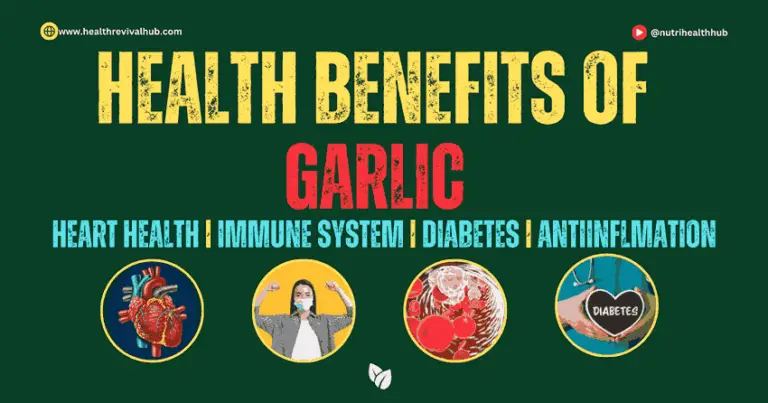Discover the incredible health benefits of garlic, supported by scientific research. Learn how garlic boosts heart health, strengthens immunity, fights inflammation, and prevents chronic diseases. Explore frequently asked questions and evidence-based insights on garlic’s therapeutic properties.
Garlic (Allium sativum) is more than just a flavorful ingredient in your kitchen—it has long been praised for its medicinal properties.
Modern science continues to validate the numerous health benefits of garlic, from its ability to reduce blood pressure and cholesterol levels to its antimicrobial, anti-inflammatory, and potential anticancer effects.
This article delves into the key mechanisms behind garlic’s therapeutic properties, backed by scientific studies, and explores its role in managing chronic conditions like heart disease, diabetes, and cancer.
We will also answer some of the most frequently asked questions about garlic’s health benefits, offering practical tips on how to incorporate this natural remedy into your daily diet.
Introduction
Garlic (Allium sativum) has been used for thousands of years in both cooking and medicine.
This pungent herb is well-known for its ability to enhance the flavor of food, but it is equally revered for its therapeutic properties.
Over recent decades, an increasing body of scientific evidence has highlighted its wide range of health benefits, making it a staple in natural health circles worldwide.
The health-promoting compounds found in garlic, particularly allicin, sulfur compounds, and flavonoids, have been shown to offer significant protective effects for the cardiovascular system, immune function, cancer prevention, and metabolic health.
This blog post will explore the scientific evidence behind these benefits, how they work in the body, and why you should consider adding more garlic to your diet.
The Nutritional Profile of Garlic
Before diving into the health benefits, it’s important to understand what makes garlic so potent. Garlic contains several key nutrients and bioactive compounds that contribute to its medicinal effects. These include:
Allicin:
A sulfur compound responsible for garlic’s distinct aroma and many of its therapeutic properties.
Vitamins:
Garlic is rich in vitamins, particularly vitamin C, vitamin B6, and selenium, which contribute to its antioxidant and immune-boosting effects.
Minerals:
Garlic is a good source of essential minerals like manganese, calcium, potassium, and iron, which help support overall health.
Garlic also contains several powerful antioxidants, which help neutralize free radicals in the body, reducing oxidative stress and inflammation.
Garlic for Cardiovascular Health
One of the most widely researched and recognized health benefits of garlic is its positive impact on heart health.
Studies have shown that garlic can effectively reduce blood pressure, lower cholesterol levels, and prevent atherosclerosis (hardening of the arteries), making it a powerful ally in the fight against cardiovascular disease.
Blood Pressure Reduction:
A study published in The Journal of Nutrition found that garlic supplementation could lower systolic and diastolic blood pressure in individuals with hypertension.
The active compound allicin helps relax blood vessels by boosting the production of nitric oxide, a molecule that dilates blood vessels and promotes healthy circulation.
Cholesterol Regulation:
Garlic has been shown to reduce total cholesterol and low-density lipoprotein (LDL)cholesterol levels, two key factors in the development of heart disease.
Garlic helps modulate lipid metabolism, leading to a reduction in harmful fats in the blood.
Prevention of Atherosclerosis:
The sulfur compounds in garlic help prevent the formation of plaque in the arteries, reducing the risk of heart attacks and strokes.
Immune System Boosting Properties
Garlic is a natural immune booster, thanks to its ability to stimulate the activity of various immune cells, including macrophages, T lymphocytes, and natural killer cells.
These cells play a critical role in defending the body against pathogens like bacteria, viruses, and fungi.
Research has shown that garlic can help prevent upper respiratory tract infections (URTIs), which are common during cold and flu season.
A study published in The Journal of Clinical Nutrition found that individuals who consumed garlic regularly had fewer episodes of URTIs and recovered more quickly when they did get sick.
Garlic also demonstrates antimicrobial properties, effectively combating bacterial, viral, and fungal infections.
It has been shown to fight off common pathogens, such as Staphylococcus aureus and Escherichia coli, by disrupting bacterial cell membranes.
Garlic and Cancer Prevention
Garlic’s role in cancer prevention is supported by substantial scientific evidence.
The sulfur compounds found in garlic, such as diallyl trisulfide, have been shown to possess anticancer properties.
Garlic works by interfering with the activation of carcinogens, promoting DNA repair, and inducing apoptosis (programmed cell death) in cancer cells.
Stomach and Colon Cancer:
Studies suggest that garlic may reduce the risk of cancers in the digestive system, particularly gastric and colon cancer.
Research published in Carcinogenesis found that garlic compounds can help prevent the formation of tumors in the stomach and colon.
Breast and Prostate Cancer:
Garlic’s ability to inhibit tumor growth extends to breast and prostate cancer as well.
Studies have shown that garlic can suppress the growth of cancer cells by modulating various signaling pathways involved in cancer progression.
Angiogenesis Suppression:
Garlic inhibits angiogenesis, the process by which tumors grow new blood vessels to supply themselves with nutrients. This can slow the growth and spread of tumors.
Garlic for Diabetes Management
Garlic may also play a significant role in managing diabetes, especially type 2 diabetes. Research suggests that garlic can help regulate blood sugar levels, improve insulin sensitivity, and reduce the risk of diabetes-related complications.
Blood Sugar Regulation:
Studies have found that garlic supplementation can reduce fasting blood glucose levels and improve glycemic control. It helps enhance insulin secretion and increases the body’s sensitivity to insulin, a key factor in controlling blood sugar.
Oxidative Stress Reduction:
Garlic’s antioxidant properties help protect the body against the oxidative stress often seen in diabetics, reducing the risk of complications such as retinopathy, neuropathy, and kidney damage.
Anti-inflammatory and Antioxidant Effects
Garlic is rich in antioxidants, which help protect the body from oxidative stress—an imbalance between free radicals and antioxidants that can lead to chronic diseases, including heart disease, diabetes, and cancer.
Reducing Inflammation:
Garlic has powerful anti-inflammatory effects, which help reduce inflammation associated with various conditions, including rheumatoid arthritis and inflammatory bowel disease.
Protection Against Chronic Disease:
By reducing oxidative stress and inflammation, garlic helps protect the body against chronic diseases, such as neurodegenerative disorders like Alzheimer’s and Parkinson’s disease.
Conclusion:
Garlic is truly a natural powerhouse, offering a wide range of health benefits supported by modern scientific research. Whether you’re looking to improve heart health, strengthen your immune system, prevent cancer, or manage diabetes, garlic is a potent and accessible remedy. Its bioactive compounds, particularly allicin, play a significant role in promoting overall health and reducing the risk of chronic diseases. Incorporating more garlic into your diet can have profound long-term health benefits, so why not start today?

